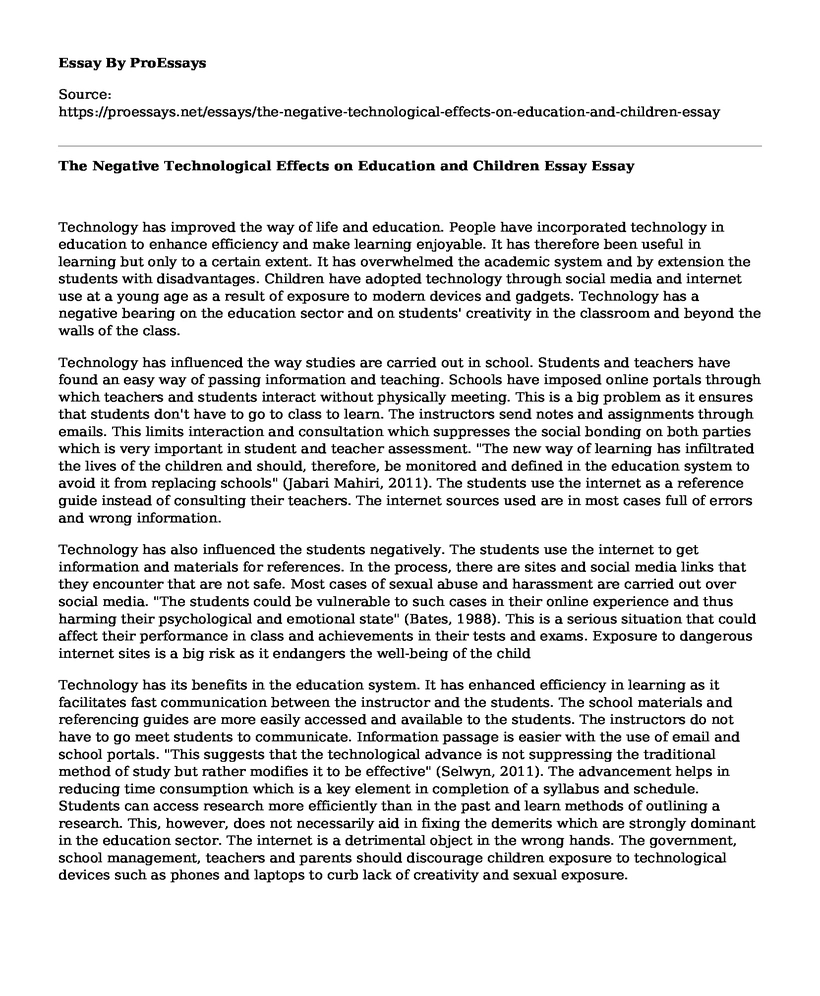Technology has improved the way of life and education. People have incorporated technology in education to enhance efficiency and make learning enjoyable. It has therefore been useful in learning but only to a certain extent. It has overwhelmed the academic system and by extension the students with disadvantages. Children have adopted technology through social media and internet use at a young age as a result of exposure to modern devices and gadgets. Technology has a negative bearing on the education sector and on students' creativity in the classroom and beyond the walls of the class.
Technology has influenced the way studies are carried out in school. Students and teachers have found an easy way of passing information and teaching. Schools have imposed online portals through which teachers and students interact without physically meeting. This is a big problem as it ensures that students don't have to go to class to learn. The instructors send notes and assignments through emails. This limits interaction and consultation which suppresses the social bonding on both parties which is very important in student and teacher assessment. "The new way of learning has infiltrated the lives of the children and should, therefore, be monitored and defined in the education system to avoid it from replacing schools" (Jabari Mahiri, 2011). The students use the internet as a reference guide instead of consulting their teachers. The internet sources used are in most cases full of errors and wrong information.
Technology has also influenced the students negatively. The students use the internet to get information and materials for references. In the process, there are sites and social media links that they encounter that are not safe. Most cases of sexual abuse and harassment are carried out over social media. "The students could be vulnerable to such cases in their online experience and thus harming their psychological and emotional state" (Bates, 1988). This is a serious situation that could affect their performance in class and achievements in their tests and exams. Exposure to dangerous internet sites is a big risk as it endangers the well-being of the child
Technology has its benefits in the education system. It has enhanced efficiency in learning as it facilitates fast communication between the instructor and the students. The school materials and referencing guides are more easily accessed and available to the students. The instructors do not have to go meet students to communicate. Information passage is easier with the use of email and school portals. "This suggests that the technological advance is not suppressing the traditional method of study but rather modifies it to be effective" (Selwyn, 2011). The advancement helps in reducing time consumption which is a key element in completion of a syllabus and schedule. Students can access research more efficiently than in the past and learn methods of outlining a research. This, however, does not necessarily aid in fixing the demerits which are strongly dominant in the education sector. The internet is a detrimental object in the wrong hands. The government, school management, teachers and parents should discourage children exposure to technological devices such as phones and laptops to curb lack of creativity and sexual exposure.
Conclusion
The discussion above demonstrates the problem of technology in schools. This is an indication of the big evil of exposing children to technological advancements and the devices. Technology has a negative bearing on the education sector and on students' creativity in the classroom and beyond the walls of the class.
Works Cited
Carr, Nicholas. The Shallows: What the Internet is Doing to our Brains. New York, W. W Norton and Co., 2010.
Flanagan, Jennifer. Technology: The Positive and Negative Effects on Student Achievement. New York, The College at Brockport, 2008.
Gazzaley, and Rosen Larry. The Distracted Mind: Ancient Brains in a High-Tech World. Cambridge, MIT Press, 2016.
Mahiri, Jabari. Digital Tools in Urban Schools: Mediating a Remix of Learning. San Francisco, University of Michigan Press, 2011.
Selwyn, Neil. Education and Technology: Key Issues and Debates. New York, Continuum International Publishing Group, 2011.
Cite this page
The Negative Technological Effects on Education and Children Essay. (2022, Aug 15). Retrieved from https://proessays.net/essays/the-negative-technological-effects-on-education-and-children-essay
If you are the original author of this essay and no longer wish to have it published on the ProEssays website, please click below to request its removal:
- Effects of Reading to Infants and Toddlers on Their Early Language Development
- Dressing for Dinner Review
- Essay Sample on Nanotechnology and Robo-Taxis
- Essay on My Journey to Becoming a Psychiatric Technician & Neuropsychologist
- Essay Example on Latino Students: Changing Lives Through Agency Efforts
- Essay on Parent Engagement: Key to Student Success & Learning Efficiency
- Essay Example on Careful Planning: The Key to Excellent Teaching







